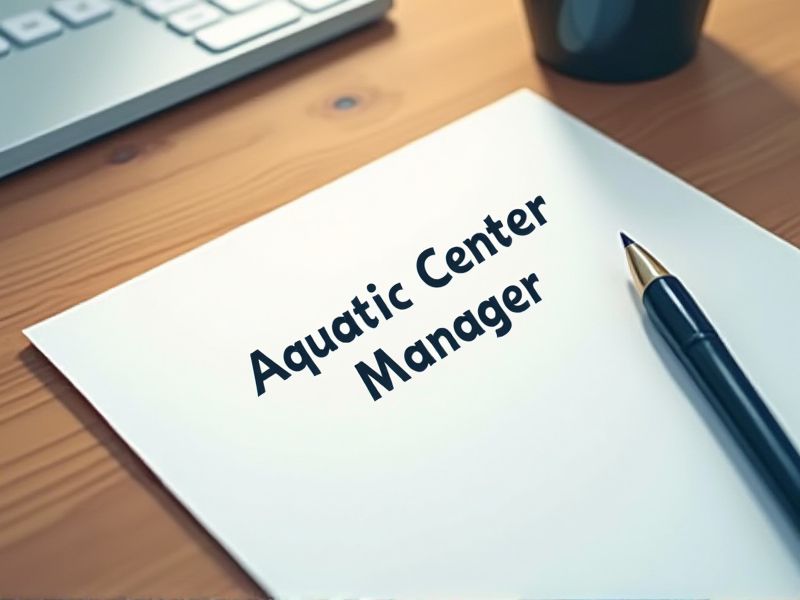
Aquatic Center Managers oversee facilities that hinge on safety and regulatory compliance. Obtaining specific certifications ensures they are equipped to manage water quality, risk assessments, and emergency response. These credentials verify their expertise in lifesaving procedures and facility operations. Key certifications you may need for an Aquatic Center Manager position are detailed below.
American Red Cross Lifeguard Certification
Possessing an American Red Cross Lifeguard Certification ensures an Aquatic Center Manager has a fundamental understanding of water safety protocols and lifesaving techniques. This certification assures that the manager is equipped to train and evaluate staff based on standardized safety procedures. It provides credibility and confidence to patrons who trust their safety to the facility's operations. Compliance with this certification can also align the center with local regulations and industry standards, potentially impacting insurance and liability considerations.
American Red Cross Water Safety Instructor Certification
Aquatic center managers need the American Red Cross Water Safety Instructor Certification to ensure they possess the skills necessary to develop and implement effective swimming and water safety programs. This certification also validates knowledge in teaching swimming techniques, crucial for overseeing staff and maintaining high instructional standards. An aquatic center manager with this credential is better equipped to manage risk and ensure patron safety through adherence to best practices. Certified managers gain credibility and trust from both staff and patrons, fostering a safe and professional aquatic environment.
American Red Cross CPR/AED Certification
American Red Cross CPR/AED certification equips an Aquatic Center Manager with the skills to respond effectively to cardiac and breathing emergencies, which are critical in a water-based environment. Having certified personnel ensures compliance with safety regulations and enhances the trust of patrons in the facility's emergency preparedness. This certification also enables managers to train and oversee staff on lifesaving techniques, promoting a safer swimming environment. The presence of certified individuals can significantly reduce response time during emergencies, potentially saving lives.
American Red Cross First Aid Certification
The American Red Cross First Aid Certification is essential for an Aquatic Center Manager as it equips them with skills to respond effectively to emergencies, ensuring swimmer safety. By having this certification, the manager demonstrates competence and commitment to maintaining a safe environment for both staff and patrons. The certification also aligns with industry standards, which increases the credibility of the management team. In case of accidents or injuries, a certified manager can provide immediate and knowledgeable assistance, potentially reducing the severity of incidents.
Certified Aquatics Manager (CAM) Certification
Aquatic Center Managers with a CAM certification often demonstrate enhanced knowledge in industry-specific safety standards, reducing accident risk. The certification can lead to improved facility management, resulting in higher efficiency and resource utilization. CAM-certified managers are typically better equipped to train and oversee staff, which can enhance overall service quality. Many organizations prefer or require CAM certification, increasing job opportunities and career advancement potential for certified individuals.
Aquatic Facility Operator (AFO) Certification
Aquatic Facility Operator (AFO) Certification ensures an aquatic center manager possesses essential knowledge in pool operation, maintenance, and safety practices. It increases the facility's compliance with industry standards, reducing the risk of health hazards and accidents. Certification establishes credibility and professionalism, fostering trust among staff and patrons. Managers with AFO certification often improve efficiency and cost-effectiveness by implementing best practices in water management and resource allocation.
National Swimming Pool Foundation (NSPF) Certification
Obtaining the National Swimming Pool Foundation (NSPF) Certification equips aquatic center managers with essential knowledge of pool operations, ensuring safe and hygienic conditions. As pool safety regulations tighten, certification provides a standardized framework to understand and implement necessary safety protocols. The certification enhances consumer trust by demonstrating a commitment to maintaining industry standards. Managers with NSPF certification often have a competitive edge in the job market, reflecting their expertise and dedication to public safety.
Facility Management Professional (FMP) Certification
FMP Certification equips Aquatic Center Managers with essential skills in efficient resource management, leading to cost savings and streamlined operations. Enhanced safety protocols become achievable, reducing accidents and liability, crucial in aquatic settings. Certification provides a competitive edge, positioning managers favorably in the job market due to demonstrated expertise. It fosters better communication and collaboration with stakeholders, improving overall facility maintenance and user satisfaction.
OSHA 10-Hour Safety Certification
The OSHA 10-Hour Safety Certification is needed for an aquatic center manager because it provides essential training on identifying and mitigating workplace hazards. This certification helps ensure that the manager can maintain a safe environment for both employees and visitors, reducing the risk of accidents. Having knowledgeable leadership in safety protocols can enhance compliance with regulatory requirements, helping to avoid legal and financial complications. Earning this certification demonstrates a commitment to safety, which builds trust and confidence among staff and patrons.
Emergency Medical Technician (EMT) Certification
An EMT certification equips an aquatic center manager with vital life-saving skills, increasing the capability to respond effectively during medical emergencies. This training enhances the safety of patrons, particularly in environments prone to aquatic-related incidents. With knowledge in emergency medical procedures, the manager can address health crises swiftly, reducing potential injury severity. Employers often prefer managers with EMT certification due to the increased safety assurance it provides to visitors.
Summary
By obtaining certifications, you demonstrate enhanced credibility and trustworthiness in managing the aquatic center. This leads to improved operational efficiency as you apply best practices learned during the certification process. Staff members become more motivated and aligned as they see the commitment to professional growth and excellence. As a result, the community perceives the aquatic center as a safer and more reliable facility, increasing its usage and revenue.
